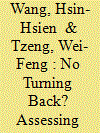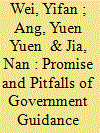|
|
|
Sort Order |
|
|
|
Items / Page
|
|
|
|
|
|
|
| Srl | Item |
| 1 |
ID:
193139


|
|
|
|
|
| Summary/Abstract |
This paper collects and analyzes the speeches of top Chinese leaders on Taiwan, the relevant remarks of Taiwan-related ministries and commissions, and important documents concerning Taiwan. It takes the visit of U.S. House Speaker Nancy Pelosi to Taiwan as an example to observe China’s current policy toward Taiwan and its intent to employ force. This paper argues that although the outside world has repeatedly emphasized that “Taiwan is the most dangerous place on earth” and that China will invade Taiwan by force, peaceful unification is still the main axis of its strategy toward Taiwan. Military force is an avenue for China to force unification and prevent international interference in the Taiwan issue. The results of our analysis of Taiwan-related remarks by top Chinese leaders and relevant ministries and commissions are also highly consistent with the political report of the 20th Party Congress, and there are two noteworthy points. First, China has linked “opposing independence” with “opposing interference by external forces” and the principle of “never renouncing the right to use force over Taiwan.” From Beijing’s perspective, the Taiwan issue is no longer one simply involving cross-strait relations but is embedded in China’s domestic national rejuvenation and the strategic competition between itself and the United States. Moreover, Xi Jinping is the most critical factor affecting cross–strait relations. As a strong leader with a historic mission, how Xi regards the Taiwan issue will affect both the destiny of Taiwan and the security of the entire Asia-Pacific region.
|
|
|
|
|
|
|
|
|
|
|
|
|
|
|
|
| 2 |
ID:
193214


|
|
|
|
|
| Summary/Abstract |
In 2005, the Chinese government deployed a new financial instrument to accelerate technological catch-up: government guidance funds (GGFs). These are funds established by central and local governments partnering with private venture capital to invest in state-selected priority sectors. GGFs promise to significantly broaden capital access for high-tech ventures that normally struggle to secure funding. The aggregate numbers are impressive: by 2021, there were more than 1,800 GGFs, with an estimated target capital size of US$1.52 trillion. In practice, however, there are notable gaps between policy ambition and outcomes. Our analysis finds that realized capital fell significantly short of targets, particularly in non-coastal regions, and only 26 per cent of GGFs had met their target capital size by 2021. Several factors account for this policy implementation gap: the lack of quality private-sector partners and ventures, leadership turnover and the inherent difficulties in evaluating the performance of GGFs.
|
|
|
|
|
|
|
|
|
|
|
|
|
|
|
|
| 3 |
ID:
189048


|
|
|
|
|
| Summary/Abstract |
Under pressure to choose between the U.S. and China, Southeast Asian countries have adopted a hedging strategy: deepening economic relations with China while strengthening security cooperation with the U.S. How does the region's public view this strategy? With tensions rising in South China Sea territorial disputes, are more nationalistic individuals more likely to oppose hedging? Using an original public opinion survey conducted in the Philippines, we find that while an overwhelming majority of respondents were concerned about the territorial disputes, more nationalistic Filipinos were no more concerned than less nationalistic ones. Further, more nationalistic Filipinos were more likely to view economic relations with China as important for the Philippines and to approve of Duterte's China policy, which follows the logic of hedging. These surprising findings suggest that under the shadow of great-power competition, the link between domestic politics and foreign policy is nuanced in the Philippines, and Southeast Asia in general.
|
|
|
|
|
|
|
|
|
|
|
|
|
|
|
|
|
|
|
|
|